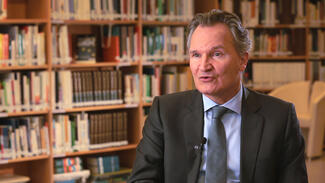
Jean-Pierre Bourguignon: Forschung für Europa
Es gibt Grund zur Sorge, dass die europäischen Universitäten bei der Forschung global ins Hintertreffen geraten und die Chinesen an ihnen vorbeiziehen. Doch es gibt auch Lichtblicke.
"The only way for Europe to compete with the rest of the world is to outsmart and outinnovative the rest of the world. And that requires investing in science and innovation."
Video abspielen
Skype? Stammt eigentlich aus Estland. Booking.com? Wurde ursprünglich in den Niederlanden entwickelt. Aber groß wurde beides erst in Silicon Valley. Robert-Jan Smits, von 2010 bis 2018 oberster Forschungsförderer bei der EU-Kommission, will Innovationen mit Wachstumspotenzial in Europa halten. An klugen Köpfen und guten Ideen mangelt es nicht, sondern an etwas, das in den USA viel besser funktioniert.
Robert-Jan Smits ist einer der Diskutanten auf dem Forschungsgipfel 2018, bei dem rund 400 Entscheider, Experten, Vordenker und Newcomer aus Wissenschaft, Wirtschaft, Zivilgesellschaft und Politik darüber öffentlich beraten, wie das internationale Innovationssystem weiterentwickelt werden kann.
Skype? An invention from Estonia. Booking.com? Originally developed in the Netherlands. But both got big in Silicon Valley. Robert-Jan Smits, Director General of DG Research and Innovation (RTD) at the European Commission, wants to give innovations the chance to scale up in Europe. There’s no lack of talent or of smart ideas, but it’s about something that gives advantage to the United States.
Robert-Jan Smits is one of the participants of the Research Summit 2018 in Berlin. 400 executives, experts and innovators from science, economy, civil society and politics discuss how the international innovation system can be improved.
Jede Woche neu beim Stifterverband:
Die Zukunftsmacher und ihre Visionen für Bildung und Ausbildung, Forschung und Technik
Autorin: Corina Niebuhr
Produktion: Webclip Medien Berlin
für den YouTube-Kanal des Stifterverbandes
Germany is a powerhouse of science and innovation in Europe. And that's very, very impressive. I think Germany is at the moment responsible for over 30 percent of all research that is being done in the European Union.
I must say that I found the German research innovation policy as I've seen it over the last 10 years extremely impressive. The Hightech Strategy, the support you give to basic research, the Exzellenzinitiative is just amazing. And you see the results of that. You see that the excellence of the science in Germany is very, very impressive. You see more and more spin-offs, start-ups getting out of universities. You see an echo system being developed in which also the large scale infrastructures play a role. So the policy which you have been having in Germany is a showcase for the whole of Europe.
So Germany is, I think, very, very well positioned at the moment. But it should not lean back comfortable in its chair thinking "Well, we are there." I think it is very important that also Germany challenges itself and keps on challenging itself through disruptive innovation, through thinking about how the big data can be used in a more effective way in the economy by digitizing industry, by looking into artificial intelligence, by making the citizen an innovator, by boosting entrepreneurship in universities. So Germany has a very strong position in Europe and in the world. But it has to be extremely careful not to become too comfortable with that and keep on re-inventing itself.
Europe cannot compete with the rest of the world with low wages because we don't have low wages. And we can't compete with the rest of the world with our raw materials because we don't have raw materials. And we do not want to compete with the rest of the world at the expense of our environment, we want to protect the environment. So the only way for Europe to compete with the rest of the world is to outsmart and outinnovative the rest of the world. And that requires investing in science and innovation.
Europe spends at the moment only 2 percent of its GDP on science and innovation. And the countries which spend more, take Germany, 3 percent going to 3.5 percent, the Scandinavian countries who are already at almost 4 percent of the GDP. But overall Europe is not spending enough on science and innovation. And that is quite frightening because we have no alternative than science and innovation, than the knowledge economy. If I see what's happening in China, the Chinese understood it quite well. They are investing bigtime in the knowledge economy. Over the last 10 years China has increased its spending on R&D with 22 percent per year. At the moment China is spending more on science and innovation than Europe. And that shows that in China people know quite well that the future of the country, the future of the economy, the future of the grand societal challenges which need to be addressed lie in the hand of science and innovation and of innovators.
Europe should only do those things which have a clear European Union added value and not do things which you can better do at national or regional level. If I take for instance the science and innovation programme which we have, "Horizon 2020", that is a beautiful example of European added value. Because our job is through "Horizon 2020" to put the best brains of different European countries together to address the grand societal challenges. When the Ebola crisis hit us and we had to eagerly and quickly develop a vexine and medication we called upon the best scientists and innovators from across Europe to get to Brussels and to develop jointly a vexine. A vexine, by the way, which at the moment is available. And that is our European added value, bringing the best brains of Europe together to find solutions to the grand societal challenges. but also bringing the different scientists and innovators together to create scale and scope through European research infrastructures. Because the infrastructures of the future are so expensive and so complex that not a single country, not even Germany is able to do it by itself. So it's important that also there different European countries are building the future generation of large scale facilities, large scale infrastructures like we see that with XFEL or we see with the Spallation Source in Lund. These are examples of European infrastructure, so the best brains again work together. That is something which Brussels should do, which the European Union should be dealing with, but also ensuring mobility between researchers between different countries. That's typically the role for the European Union. Everything which can be done at regional or local level should be done at regional, local and national level, taking care of our start-ups, of our spin-offs at university, that's typically a local, regional or national responsibility, and that is not the role of the European Commission to get involved in that.
One thing I saw very much in "Horizon 2020" and that's something that positively impressed me is the quality of the scientists and the innovators we have in Europe. The proposals we are getting in the context of our calls for proposals are very, very impressive. And that shows that Europe has so much to offer, not only to itself but to the rest of the world. And it is indeed impressive that our continent which only has 7 percent of the world's population still produces today one third of the world's knowledge. And that is thanks to our first class education system, that is thanks to also the freedom and democratic system which we have, and that is thanks to the excellent universities and research centres we have and of course the companies, small and big ones. We can be very proud of what we produce in Europe in the field of science and innovation.
As a matter of fact, we have the same number of start-ups and spin-offs in Europe as in the United States. But if you see how many pass the value of debt we see that in Europe a lot of them don't make it through the value of debt. And it has to do with that fact that we don't have this venture capital landscape in Europe. And there I think governments need to take action at national and at European level. We are certainly at the European Commission taking our own responsibility. We are developing at the moment initiatives to boost venture capital further in Europe. And that is necessary because I think it is extremely sad if we see that start-ups, whether it's in Germany, whether it's in France or in the Netherlands or in Spain, with brilliant ideas are not able to scale up in Europe and go to the United States. Take for instance Skype, an invention of Estonia but commercialized in Silicon Valley. Take booking.com, invented in Twente, Twente University in the Netherlands, commercialized in Silicon Valley. Well, this is something which has to stop. We need to give those start-ups, those innovators the chance to become big and to grow in Europe.
Recently there was the web summit in Lisbon. There were 15,000 young innovators, mostly active in the field of ICT and the digital area. Many of them, most of them had never heard of the national support programmes for science and innovation or the European support programme for science and innovation. They do their thing themselves through crowdfunding, business angels. They don't know about these support programmes. But they have the feeling that they are not getting the recognition in our society, in our programmes which they should deserve and perhaps get. So we have a large group in our population, innovators who are often not working for the established institutions but who are the ones who will change our society. And it is that group which we need to really make sure that they have the possibility to follow their dream, often crazy ideas which they have, they would like to pursue. Give them the freedom to do that! And that is something which I think requires a mentality change of funding organisations, a mentality change of ministries but also at European level that we are giving much more attention to these people but also listen to them. What is it that drives them? What is it that they need? What is it which will allow them to realize their dream?